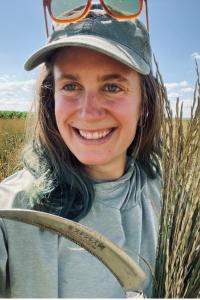Dr. Hannah Rodgers joined the Climate Hub in 2024, after completing her PhD in soil science at the University of Wyoming. Her PhD research focused on how land management decisions can support soil health in semiarid grain production systems, and how soil microbes can help us predict changes in soil health. In particular, she studied a perennial grain called Kernza as a possible option for wheat-fallow agriculture. She also studied the impacts of Kernza plant breeding on the symbiotic bacteria and fungi that live on plant roots. Her work is informed by the concept of Natural Systems Agriculture, which studies agricultural systems that try to mimic our native ecosystems and the ecosystem services they provide. In her role with the Climate Hub, she hopes to help find ways to enhance soil & crop health, productivity, economic security, and climate resilience, in part by facilitating collaboration among local farmers, researchers, and technical service providers.
Previously, Hannah received a bachelor’s degree in biology from Oberlin College and worked as a research intern for a non-profit, science-based, research organization in Salina, Kansas. She also spent a year living in an agricultural village in Sindhupalchok, Nepal, teaching English through a Fulbright grant. In her free time, Hannah likes to hike, bike, and canoe around Laramie, Wyoming, and teaches pottery to community members.


